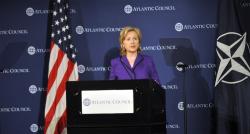
In her Atlantic Council speech on the future of NATO, Hillary Clinton declared unequivocally that the Alliance should work closely with the European Union on security issues, a welcome evolution in America’s foreign policy.
Clinton stated, "I know that in the past, the United States has been ambivalent about whether NATO should engage in security cooperation with the EU. Well, that time is over. " Even more boldly, she continued, "We do not see the EU as a competitor of NATO, but we see a strong Europe as an essential partner with NATO and with the United States."
There’s not much doubt that many American policymakers have been leery of the Common Security and Defense Policy and its various predecessors, fearing that if Europe looked to its own security it would have less need for the United States and NATO. Indeed, many European NATO members, most notably the UK, had similar concerns.
Still, going back to the mid-1990s, the administration of President Bill Clinton recognized that there were significant advantages to having Europe take more responsibility for operations in its own area. Not least of these, of course, were burden sharing and cost reductions.
The 1996 Berlin ministerial envisioned building "a European Security and Defense Identity within the Alliance" and "permitting a more flexible and mobile deployment of forces, including for new missions, this concept will facilitate the mounting of NATO contingency operations, the use of separable but not separate military capabilities in operations led by the WEU, and the participation of nations outside the Alliance in operations such as IFOR."
The ministers recognized that there would be non-Article 5 operations that would be of more interest to the Europeans than the Americans, that there should be flexibility to allow coalitions to be formed to undertake said operations, and that NATO forces and institutions might be permitted to participate.
Then-Secretary of State Madeleine Albright further articulated US policy on this at the December 1998 ministerial:
We enthusiastically support any such measures that enhance European capabilities. The United States welcomes a more capable European partner, with modern, flexible military forces capable of putting out fires in Europe’s own back yard and working with us through the Alliance to defend our common interests. The key to a successful initiative is to focus on practical military capabilities. Any initiative must avoid preempting Alliance decision-making by de-linking ESDI from NATO, avoid duplicating existing efforts, and avoid discriminating against non-EU members.
These are the so-called "Three Ds." Others have dubbed this the "NATO First" policy — the Alliance gets first dibs on operations, with ESDP having the option to backstop if NATO fails to agree to act. A 2002 RAND monograph by former NATO Ambassador (and current Atlantic Council board member ) Robert Hunter added an implied "Fourth D" for decoupling. The United States was happy to have a NATO-within-NATO so long as it didn’t threaten the transatlantic alliance.
But it’s rather clear by now that ESDP isn’t a competitor to NATO. Indeed, the problem isn’t that the Europeans are robustly engaging in military operations without us but that they’re mostly underfunding their defense forces and reluctant to participate even in missions they’ve agreed to join. The problem, then, with ESDP-NATO relations isn’t one of conflict but rather of coordination. The D that most needs attention these days is Duplication.
James Joyner is managing editor of the Atlantic Council.
NATO Strategic Concept Blog Series:
- Jones: NATO Must be Lean, Agile and Flexible
- NATO’s New Strategic Concept Must Make Alliance Relevant
- Clinton: NATO Reform Needed
- Clinton: EU No Threat to NATO
- Clinton: Cyber Security and Energy Security as NATO Priorities
- Clinton on Russia and NATO
Image: Clinton.warsawbiopic.jpg
